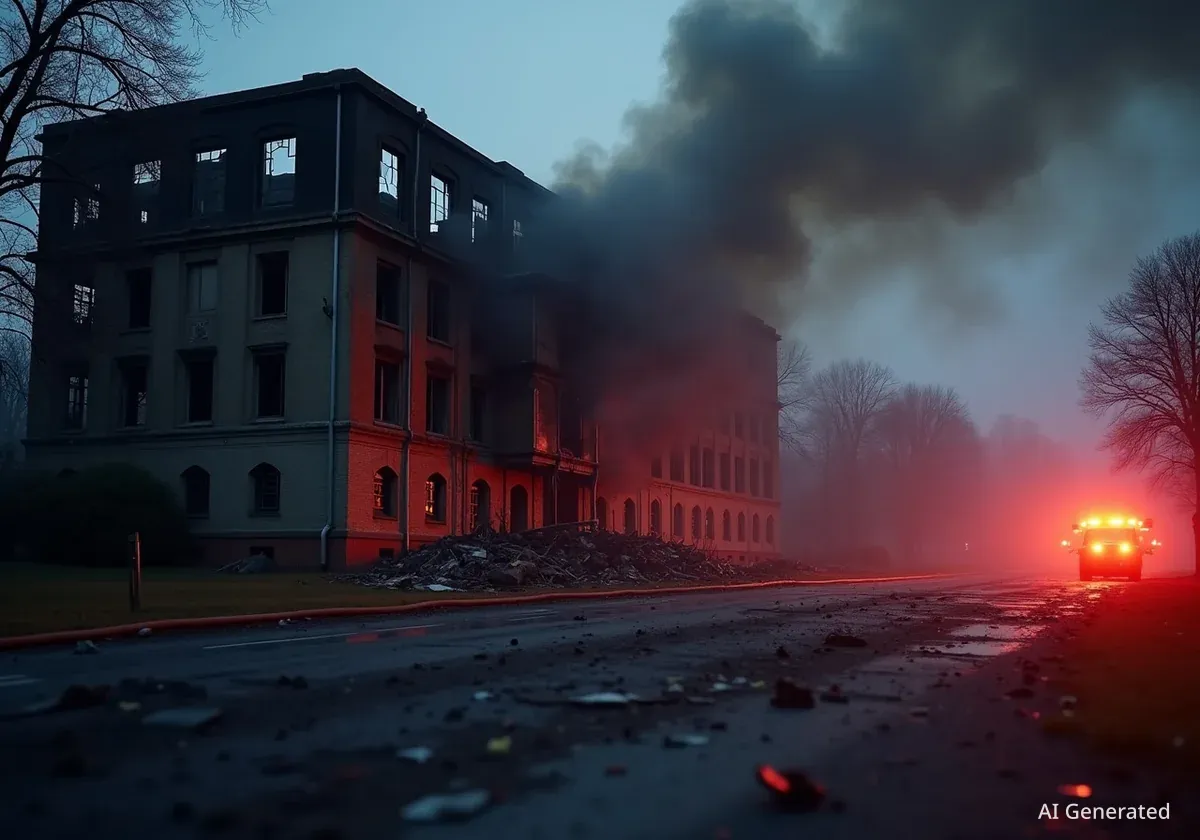The University of Fort Hare, one of South Africa's most historically significant institutions, has suspended all academic activities and closed its main campus following a series of violent protests. Several key buildings were set on fire in what the university described as petrol-bomb attacks.
The university administration ordered all students to vacate the Alice campus by Thursday afternoon. The unrest stems from student dissatisfaction with changes to university governance and calls for the removal of the vice-chancellor.
Key Takeaways
- The University of Fort Hare has suspended all operations at its main Alice campus due to violent unrest.
- Several buildings, including administrative and student affairs offices, were set ablaze.
- Student protests are reportedly linked to changes in student governance and demands for the vice-chancellor's resignation.
- University leadership has alleged that the destruction involves "sponsored violence and criminality."
- Police have confirmed the fires but have not yet made any arrests.
Campus Operations Halted Amid Destruction
The University of Fort Hare's management made the decision to shut down its main campus in Alice, Eastern Cape, to ensure the safety of its community. The closure followed acts of arson that targeted critical infrastructure.
In a statement, the university confirmed that several buildings were torched. Among the structures affected were the main administrative building and offices related to student affairs. The attacks have significantly disrupted the university's academic program and administrative functions.
All students were instructed to leave the university premises by 17:00 local time on Thursday. The administration stated that the "actions of a few" had compromised the safety of the entire university community, leaving them with no choice but to suspend activities indefinitely.
Student Protests Over Governance Issues
The recent turmoil is rooted in deep-seated student grievances. Reports indicate that the protests were triggered by recent changes to the structure of student governance. Additionally, students have been demanding the removal of Vice-Chancellor Professor Sakhela Buhlungu.
Student leader Asonele Magwaxaza spoke to the state broadcaster SABC, expressing the students' position. He described a feeling of being ignored by the university's leadership.
"The student governance has been suppressed and compromised... We have been writing to the council, to the management, but they are arrogant, they are not responding, they are not doing anything," Magwaxaza stated.
He added that students were "angry... frustrated because they have been suppressed." Despite the eviction order, student representatives have indicated their intention to continue the protests, according to local news outlet Newzroom Afrika.
Conflicting Injury Reports
While the university and police reported no injuries or deaths resulting from the fires and unrest, a student leader claimed otherwise. Asonele Magwaxaza told SABC that two students were injured during clashes with security officers on campus.
University Alleges External Criminal Influence
In response to the escalating violence, Vice-Chancellor Prof Sakhela Buhlungu suggested that the events were not merely a student protest. He pointed to a more organized and sinister element behind the destruction.
In a formal statement, Buhlungu remarked on the "large-scale destruction of property." He asserted that the university was dealing with "much bigger issues with a significant component of sponsored violence and criminality." This suggests the university believes external parties may be fueling the unrest for their own purposes.
The administration's stance frames the incident not just as an internal dispute but as a criminal matter that threatens the institution's stability and future.
Police Investigation and Tense Atmosphere
Law enforcement has been deployed to the area to manage the situation. Police spokesperson Siphokazi Mawisa confirmed that protesting students had set four buildings on fire at the university. She described the current situation on campus as remaining "tense."
As of the latest reports, no arrests have been made in connection with the arson attacks or the broader unrest. The police investigation is ongoing as authorities work to identify those responsible for the destruction of university property. Education officials were reportedly scheduled to meet with student leaders on Thursday to discuss the grievances.
A Legacy of Leadership and Resistance
Founded in 1916, the University of Fort Hare holds a unique place in African history. It was a key institution for black Africans seeking higher education during colonial and apartheid rule. Its alumni include some of the continent's most influential leaders who opposed colonial and minority rule.
- Nelson Mandela: Former President of South Africa and anti-apartheid icon.
- Robert Mugabe: The late former leader of Zimbabwe.
- Seretse Khama: The first President of Botswana.
For many, the university was a cradle of political activism and intellectual resistance, making the recent events particularly poignant.
The Path Forward Remains Unclear
With the campus closed and academic life on hold, the future for students and staff at the University of Fort Hare is uncertain. The immediate priorities for the administration will be to secure the campus, assess the full extent of the damage, and work with law enforcement.
The fundamental disagreements over governance and leadership must be addressed for the university to resume normal operations. The planned meeting between education officials and student leaders could be a crucial first step, but rebuilding trust and infrastructure will be a long-term challenge for this historic institution.





